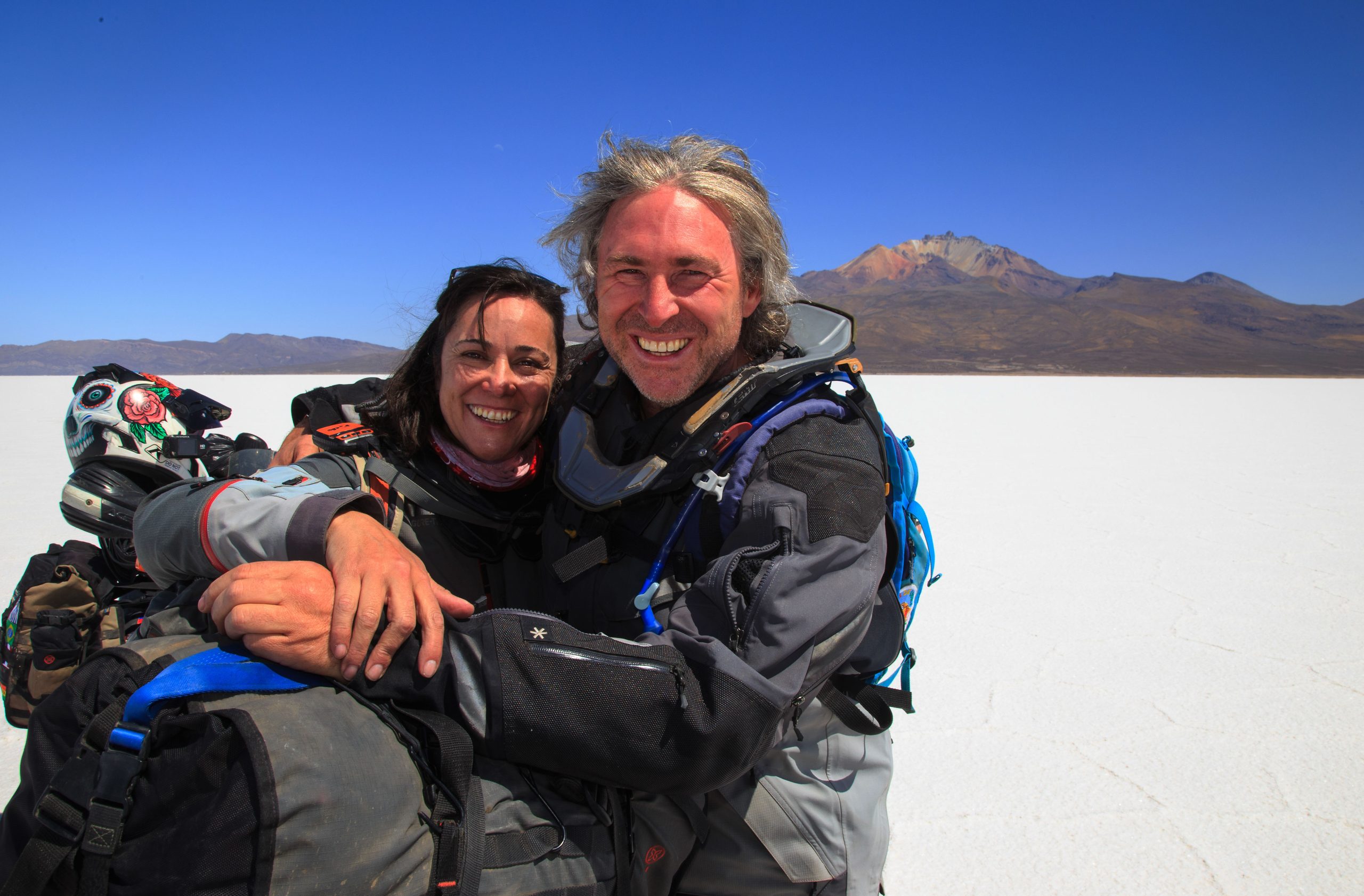Michnus and Elsebie are explorers with an insatiable thirst for authentic adventure. They chose to ride two medium-size motorcycles and have established themselves as experts in the field of motorcycle travel. They are people of great humor and integrity, the salt of the earth. Their photography stands out from the crowd, partially due to technical excellence, but mostly due to their eye for the culturally exceptional and the relationship of trust which they establish with their human subjects. Michnus and Elsebie are not interested in bucket lists or the ticking of boxes; they ride for the love of travel and immerse themselves deep within the countries they explore.
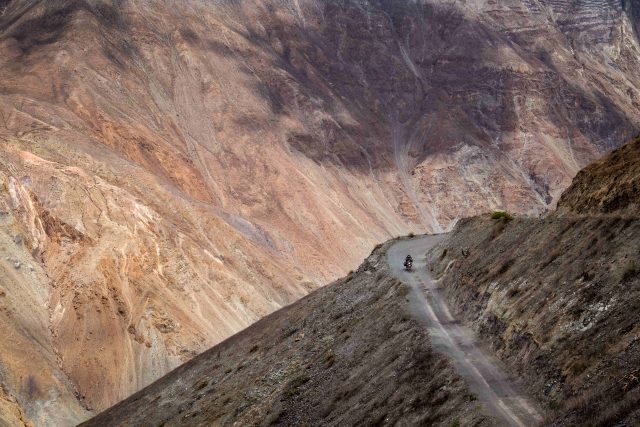
How did you begin traveling, and when did you decide that the overland lifestyle would be a large part of your future?
Michnus: It started almost 27 years ago when we were in our early twenties. Together with my sister, Tharina, and her husband, Erik, Elsebie and I concocted a long trip to the northern part of Namibia, called Kaokoland, and some of Botswana and Zimbabwe.
Months of saving and living like paupers pursued, as we had to take unpaid leave. Parents’ money, GoFundMe, and begging for free stuff was out of the question. We were all bloody poor, but somehow, we all came up with the cash.
We were proper greenhorns with not one iota of an idea how to overland, drive 4x4s, and the rest that goes with it. Erik and I had the customary, obligatory, South African army training and could at least read maps and use MacGyver-style skills to fix things and hopefully survive.
There was no GPS, mobiles, or high-tech stuff. We were only armed with paper maps we obtained with much difficulty from the geographical department in Pretoria. We borrowed cameras, and each bought a video camera. Cameras used roll films, so we had to plan carefully around how many rolls to take and how to store them. Unfortunately, very few photos developed in the end. The video cameras still used those terrible VHS tapes and the novelty quickly wore thin.
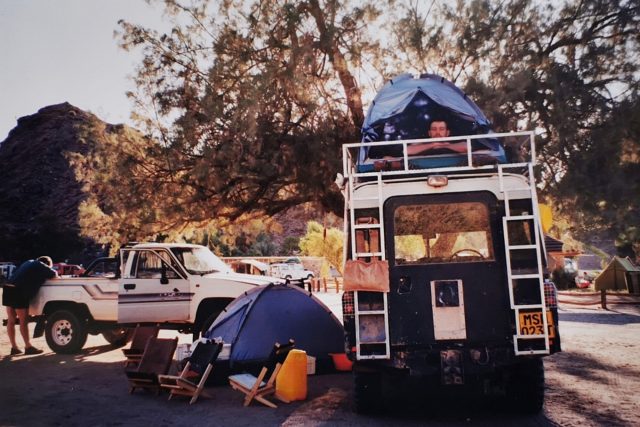
Erik and my sister bought an old, straight-six petrol army Land Rover, and we used a single cab 4×4 Toyota Hilux. The Landy felt like driving an ox-wagon—brutally hard work. We didn’t have money for new tires and just used the old ones that came with the cars. Incredibly, they (and us) survived the rocky terrain of Kaokoland.
We drove roads that took us up to five days, not seeing a single person. With more ignorance and stupidity, we took roads into pretty scary off-road areas. Nevertheless, the cars did it with our homemade sand recovery boards and all. It was a proper uncomplicated, unadulterated, fun trip—scary at times—but it lit the fire to our passion and love for overland traveling. The curiosity and keeping-you-real adventurous style of travel hooked us.
What motivates and inspires you to travel?
Curiosity—seeing, tasting, experiencing, and exploring the blue marble we call home makes us feel like kids in a massive candy store. There is so much to enrich your life with, so much to see, and we only have this one chance.

That first experience in Namibia kindled the flame to see what was over the next border. It was like the addiction was [increasing] over time, but at least it is a good one. We are not money rich, but we feel incredibly fortunate to have experiences that are now part of our old age pension. We have such amazing memories, stories, and photos.
What is your life philosophy?
Life comes at you fast bro, do not waste! Best explained by a [lyric] from a Pink Floyd song:
“For long you live and high you fly
And smiles you’ll give and tears you’ll cry
And all you touch and all you see
Is all your life will ever be”
Make things happen, be kind, be real, stay honest, and make sure you can one day say you did not waste this one chance at life. Do whatever it is that makes you tick.
What are your favorite overland destinations so far?
For sheer, mind-bendingly beautiful landscapes, South America. For cultures and people, Mexico, Portugal, and Europe are some of our favorites. For prickling adventure, the taste of dust, and roughing it, beautiful Africa is the one.
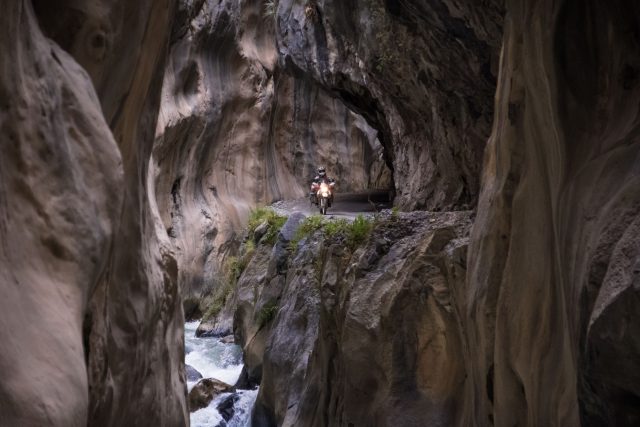
That is probably part of the reason why we find it so difficult to stop, and say, right here is where we want to grow roots. Every continent is different—the diversity of people, cultures, and landscapes offer different tastes.
What do you love and dislike about the overland biker lifestyle?
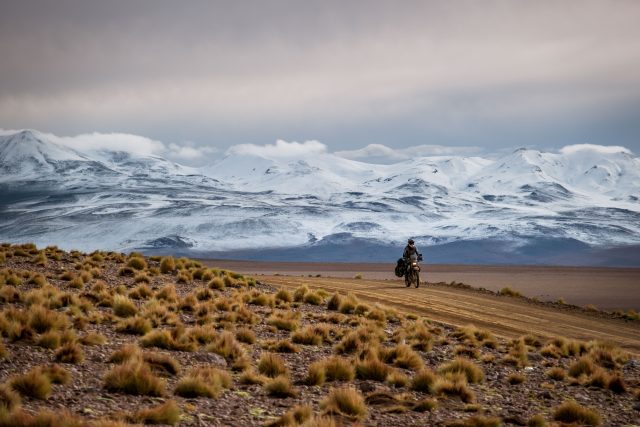
Without a doubt, riding dirt roads in remote places is always better on a bike than [in] a car: the fun, excitement, thrill of being fully focused, feeling all the elements. The same goes for incredible tar mountain passes. When you kick the side stand out [in the] late afternoon after a hell of a day passing mesmerizing landscapes, the tiredness and dust-covered smiling face is the definition of happiness for us and is just priceless.
Riding makes you part of the place you visit. The heat, humidity, smells—there is no glass between you and the outside world, and you must pay attention. You feel truly part of the place and sometimes even taste the bugs in the teeth.
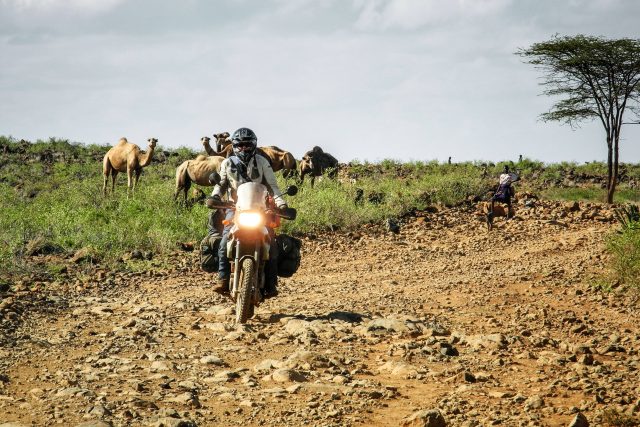
For some reason, local people see and treat us differently when we are on bikes than when we overland in a car. Maybe it is just that they are more curious, or maybe they feel sorry for us. We have been offered water, food, a place to stay, or beer many times.
What we do not have is the ability to camp and stay self-supported for as long as 4×4 overlanders can. This is a pain in the ass, especially when we want to visit game parks or places where three to seven days minimum of food, water, fuel, and such are required. Taking photos is also a mission—not just a quick get out of the car dressed in comfortable clothing to hit a shot.
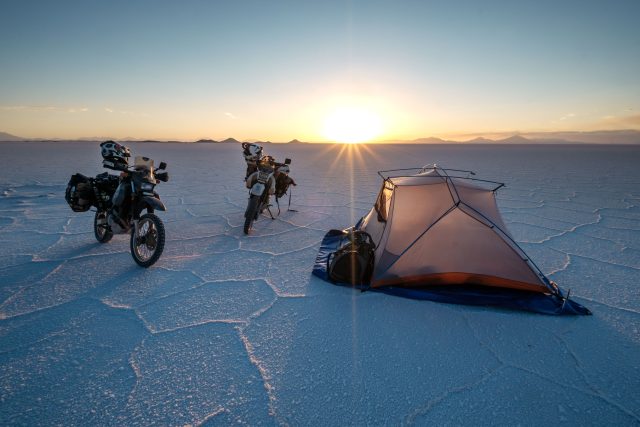
Our gear allowance (spares included) is a maximum of 30 kilograms each, and there isn’t space for many luxuries. Souvenirs are mostly made up of beer bottle caps or coasters from bars.
How has traveling changed you both?
Being more understanding and mindful of the people and countries and the difficult challenges they face. Countries differ, but most are not nearly as bad as what the media is shouting to people.
Overlanding rarely brings the same daily activities. We are constantly learning to be able to accept change and improve on our problem-solving skills daily. Our businesses still run back home, and it was an expensive learning curve to keep them going without us. We learned to get by and make do with what we have and to have the courage to go see places not on the well-trotted-through routes.

It also taught us how to make new friends and not fall back into being introverts. You must talk to people, and it is more difficult with cultures and language barriers. But somehow, that also brings personal growth and keeps the brain exercised.
How do you afford to travel?
We realized early on that working a day job for a boss would never allow us to be independent. Neither would it bring more than just normal savings, never mind allow for travel for extended periods of time.
By the time we started the bikes in 2010 for our first long trip, we had worked for a few years at buying up old, dilapidated properties to renovate them for renting out. We worked long hours for years, on top of our day jobs, saved as much as possible, did not buy new stuff, and used our pension contributions and some bank loans to fund our optimistic business ventures. It was a daring operation, as we did not have funds for upmarket properties, so we bought at the lower end of the market.
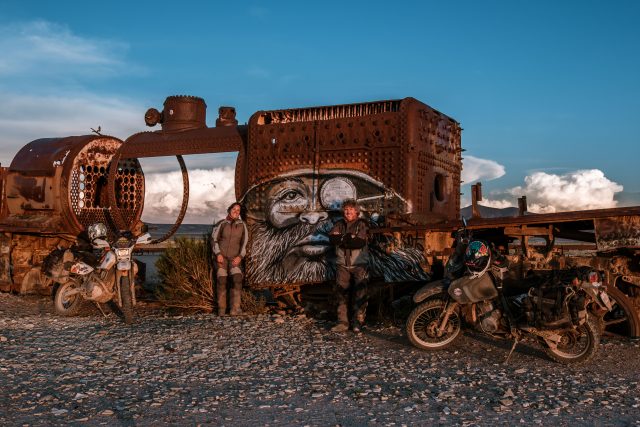
When the market hit a property slowdown, we founded a brand of motorcycle luggage to sell locally to help fund our dreams and carry on our small stream of passive income. The brand eventually did very well, and we were able to sell it a few years later to fund a portion of the unconventional dream. To this day, our main income is from the few properties and the rental income.
Travel dreams and goals?
We would be extremely grateful if we could keep the health and some funds going to explore the next country and the next until the legs do not want to carry us anymore. Or, that day when we find a spot we fall in love with and just cannot get ourselves to leave—then we will plant the garden gnome outside.
What has surprised you the most about overland travel?
This is worth a book. The world is not nearly as dangerous as many make it out. Except for customs officials and taxi drivers (ha, ha), most people will help when you ask for help and not overcharge you.
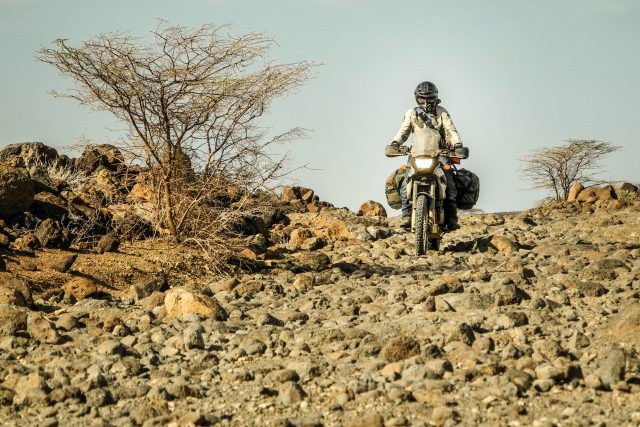
We also realized that the world is a small place, and the long-term dyed-in-the-wool overlanders are not that many. You will probably run into them on another continent again a few years later. Overlanding is the quintessential means of traveling and an immersive way to experience and see the world. You are close to the dust and deal directly with the world around you in a proper way. Flying in and out of countries, hitting them for a week or two, and showing passport stamps, is not comparable to the raw close-to-the-skin experience that overlanding offers.
What does PikiPiki mean, and why is it your travel name?
The direct translation is motorcycle in Swahili. But most use it to mean a small motorcycle, as that is predominantly what the people in Africa ride. Even our 650cc mid-size bikes are considered big for them. We chose the word as we are part of our home continent, Africa.
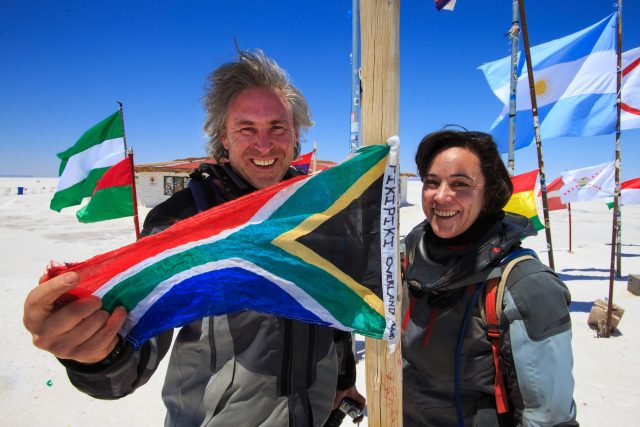
How has the pandemic affected your journey?
The pandemic had a massive effect on our travels, but from the bad came the good. We rode into Bolivia with our motorcycles at the start of the pandemic and were exploring an extremely remote region in the south of Bolivia. There was limited connection, and by the time we booked into a hotel at the Salar de Uyuni, the pandemic was thick into days of global lockdown. Friends in Sucre told us in no uncertain terms to try and get to them as soon as possible as we did not want to get locked down in the small tourist town of Uyuni.
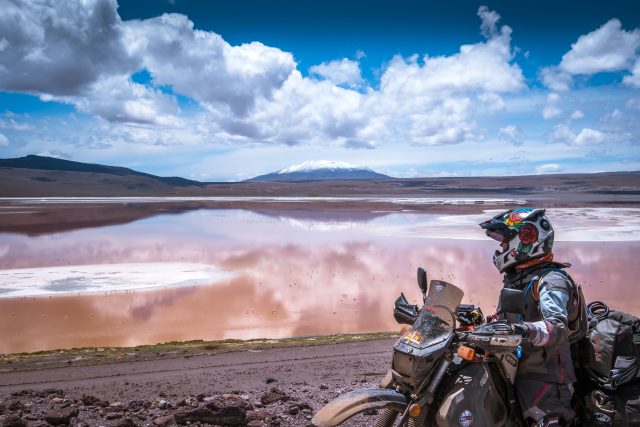
Mere days later, the world locked up, and [not until] eight months later were we able to leave the Airbnb to take a trip back to the Salar. The Bolivian lockdown was incredibly strict, and even just going to the shop for food was a mission.
Going back to South Africa was not an option due to ongoing flight cancellations and travel bans, so we opted to ride around the rural parts of Bolivia in hopes that borders and the world would open up again. A few days short of a year being stuck in Bolivia, we stored our bikes and flew to the USA, as we were not able to extend our visas in Bolivia again.
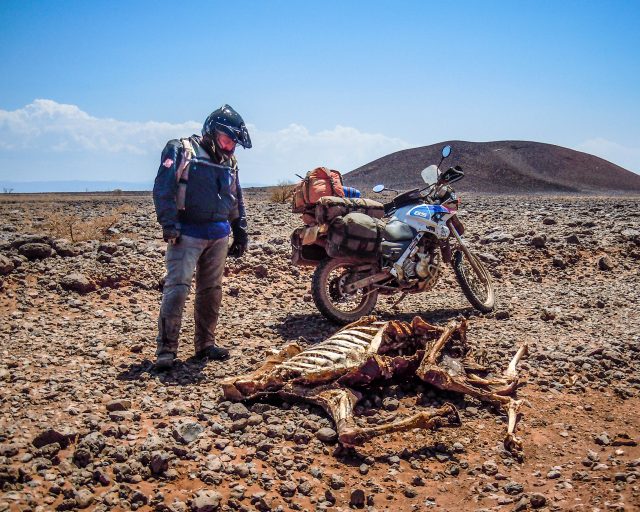
In the USA, we bought a cheap 4×4 Toyota Highlander to get around. For the last 10 months, we have trekked around the USA and Mexico, still waiting for the world (South America especially) to get back to normal. Now, having gratefully received the vaccines in the USA, we are planning to fly back to Bolivia as they have now opened borders to neighboring countries.
Tell us about your bikes
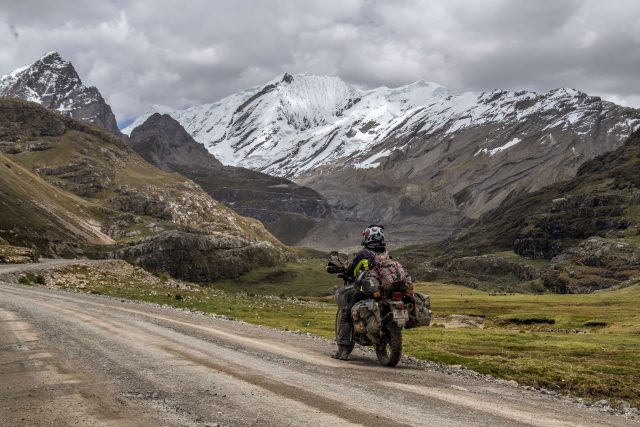
We started riding out of South Africa toward Europe in 2010 with two BMW 650 Dakars. They were good for the function, but by the time we got to Europe, they cost us a fortune in repairs and time, so we parked them. We bought two very low mileage Suzuki DR650s in the USA next, kitted them, and have been using them since. They are like old sturdy Land Rovers or Land Cruisers.
Mileage?
The current mileage of the Suzukis is 65,000 miles. We are not sure of our total mileage since we left more than a decade ago.
Fuel consumption?
If we keep it calm and speed at 50 to 60 mph, we can average 50 mpg per motorcycle, but when we hit sand and hard off-road, that drops significantly.
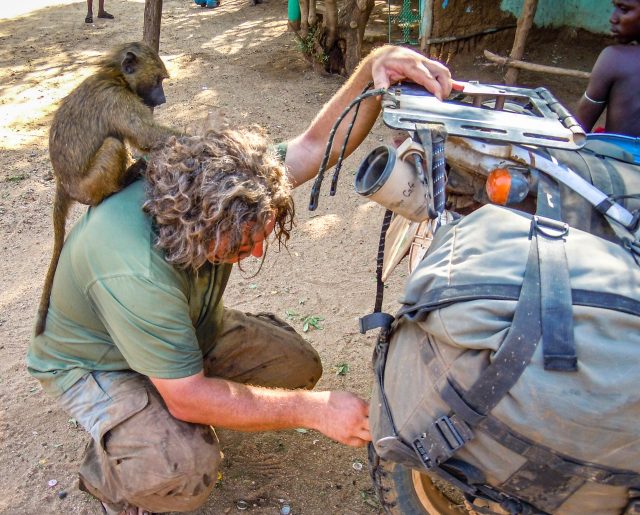
Modifications?
We are from the minimalist overland school and only changed what was necessary, like bigger fuel tanks to 26 liters, upgraded suspension, better seats, stronger handlebars, footpegs, pannier racks, and GPS to be used as speedo and trip routing. Some smaller upgrades [include] headlights and electrical charging points.
Future modifications?
We would love to upgrade our GPS units as ours are getting old. The absolute wish is to have tubeless rims, but that is either impossible or exorbitantly expensive. The best-case wish list scenario is to upgrade the bikes to 701 Husqvarnas, eventually.
Regrets?
Yes, that we didn’t have the brains to figure out earlier how to get money to start traveling when we were younger. The world was different back then and offered a different way of travel. Nevertheless, just more reason why we must make the most of each day.
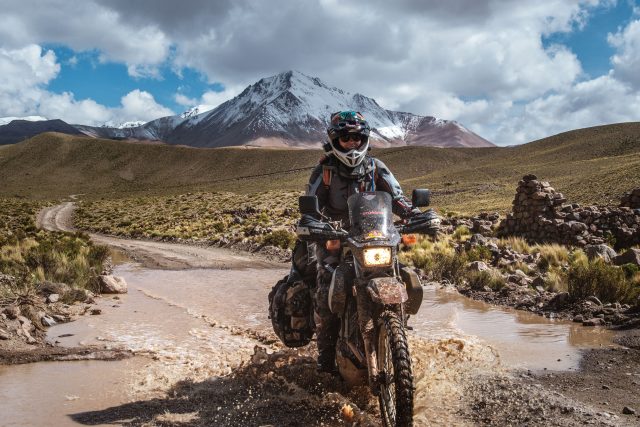
We also learned too late how to take proper photographs. It is the ultimate memory collection bank when the brain starts to fade. There are so many moments I think back on that I would love to hold a photo of today, to recall the memory more vividly.
Social media:
Instagram – pikipiki_overland
Facebook – PikiPikiOverland
Twitter – What’s? That’s for politicians 😀
Website – www.pikipikioverland.com
Our No Compromise Clause: We carefully screen all contributors to make sure they are independent and impartial. We never have and never will accept advertorial, and we do not allow advertising to influence our product or destination.


